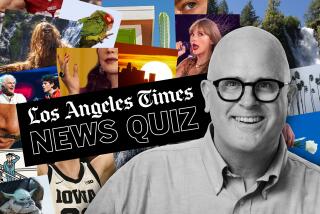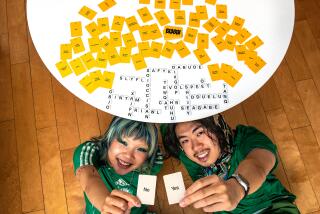Clued in for answers
- Share via
NEW YORK TIMES crossword puzzle editor Will Shortz is considered the Wizard of Oz by crossword puzzle fanatics.
“He’s the man behind the curtain,” said Patrick Creadon, director of “Wordplay,” a documentary on Shortz and crossword fans. “He has all the answers.”
Shortz is so well respected that when “The Daily Show” host Jon Stewart wanted to propose to his girlfriend, he called on the editor to help him create a crossword puzzle wherein the clues would lead to the marriage proposal.
Stewart recalls in the documentary, which opens Friday, that he was surprised when he first met Shortz. “When you imagine ‘crossword guy,’ you imagine he’s 13 or 14 inches tall” and that he’s someone “who doesn’t care to go more than five feet without his inhaler. And yet he’s a giant man. He’s the Errol Flynn of crossword puzzling.”
Creadon, a cameraman who makes his directorial debut with “Wordplay,” was discouraged by colleagues from making the film. “They said that’s a terrible idea -- it’s going to be boring,” he recalled.
But Creadon and his producer-wife, Christine O’Malley, were enthused with the challenge of making an entertaining film “about something that is typically done in the quiet time of day or the off hours of the day.”
Besides, he and his wife have been addicted to the New York Times puzzles since their honeymoon in 2000.
“One day we just sat down and solved a puzzle. It was a blast. Neither of us had done it before. My wife and I -- aside from the fact that we own a production company together and have two small children -- believe it or not, doing crossword puzzles is a real bond for us. It is a constant reminder that I am married to a very smart woman.”
The L.A.-based Creadon has high praise for the L.A. Times puzzles, as well as the Wall Street Journal’s Friday puzzle. But the New York Times crossword, he said, is the most famous. “They have taken it very seriously,” he said.
“One thing worth noting is that when Will Shortz took it over in 1993, I think the puzzle was getting a little dated and maybe even a little stale. Will brought so much more playfulness to it.”
INITIALLY, Creadon and O’Malley set out to make a film just about Shortz, the New York Times puzzles and his National Public Radio show. “But we realized right away it is really a movie about a community of people,” he said.
In fact, it’s estimated that about 50 million Americans do crossword puzzles every week.
“Wordplay” not only visits with such famous crossword puzzle players as Bill Clinton, former Sen. Bob Dole, documentarian Ken Burns and Yankee pitcher Mike Mussina, the documentary also follows several renowned solvers as they compete in the 28th annual American Crossword Puzzle Tournament in Stamford, Conn.
Hosted and directed by Shortz, the tournament is the nation’s oldest and largest competition.
“Will said early on, ‘You have to come to the tournament. It’s a big part of my life,’ ” Creadon said. “We said, ‘OK. But how exciting could a crossword tournament be?’ From a storytelling sense, we were really lucky. It was the most exciting year in tournament history.”
“The movie has so much emotion in it,” said Shortz, 53, who earned a degree in enigmatology -- the study of puzzles -- at Indiana University. “That is part of what surprises me about it. Crosswords are naturally playful and funny, but in the second half of the film, I start to sweat every time I watch it.”
Among the participants profiled are piano player Jon Delfin, who has won the tournament seven times; professional crossword constructor and three-time winner Trip Payne; the 2001 winner, editor Ellen Ripstein; and this year’s winner, Tyler Hinman, a recent graduate of the Rensselaer Polytechnic Institute in New York.
“I was the only one to finish the last puzzle in the allotted time,” Hinman said. “The allotted time is 15 minutes, and it took me 11 minutes and 20 seconds. It was pretty crazy.”
Hinman attempted his first puzzle in the ninth grade. Though he failed abysmally, he was hooked. Now he does seven puzzles a day.
“I like crosswords because you are thinking about words in a different way,” he said. “There is this set of problems in front of you and you figure them out. The New York Times really pushes the envelope in terms of having words that are really lively.”
Because of time constraints, Shortz rarely creates a puzzle for the Times.
“I get so many great submissions from other people,” he said. “I think it would be presumptuous for me to put my work in the Times.”
Shortz receives about 60 to 70 puzzle submissions a week. “I can only publish seven per week so it is very competitive to get in. I have a large inventory; I have months’ and months’.”
Puzzles must adhere to strict guidelines -- no answer can be a bodily function, for example.
“Everything has to be factual,” Shortz said. “You would never say a ‘brilliant’ president or a ‘fine’ brand of cigarettes. Everything has to be neutral.”



